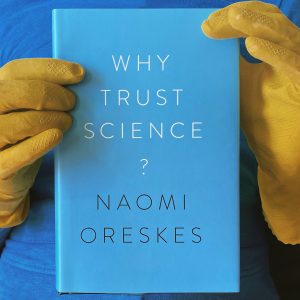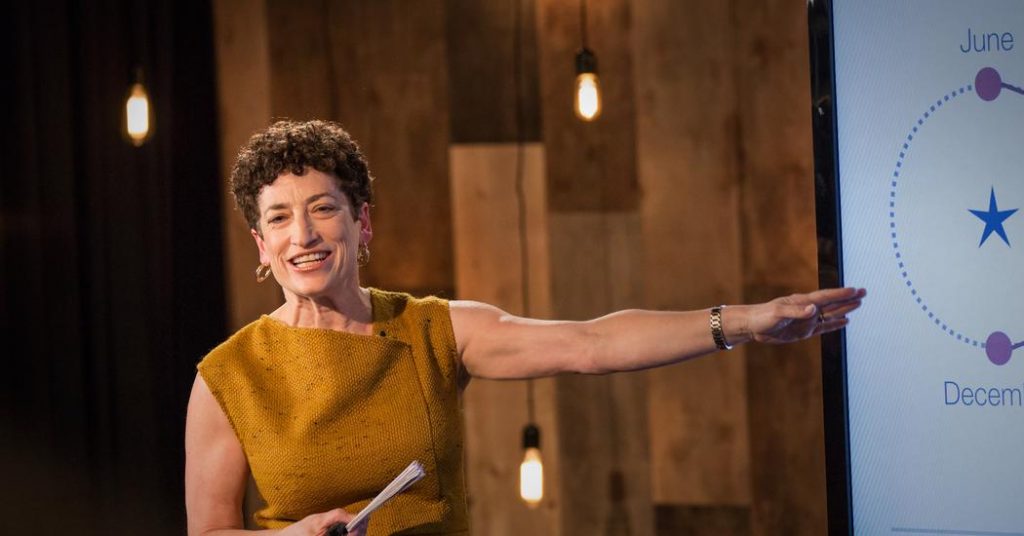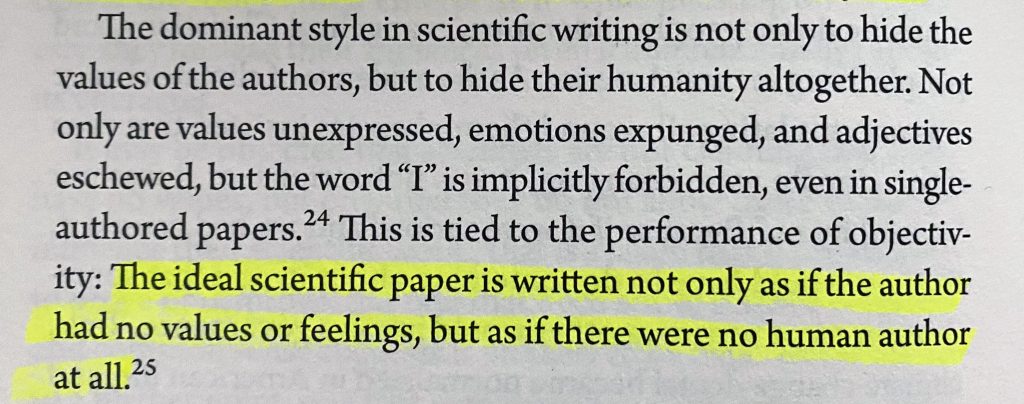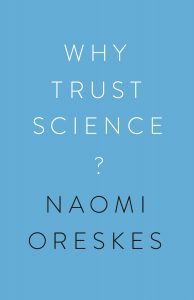"You have to be able to live with the work. Some images, if they reveal too much, you just don’t fancy living with them."—Alicja Dobrucka, in our interview about her photobook, I like you, I like you a lot.
Why trust science? A review of Naomi Oreskes' book in defense of science
 The question Naomi Oreskes poses as the title of her latest book, Why Trust Science?, is a provocative one: I know this, because after the book arrived and I laid it on the coffee table, my partner bristled silently at the sight of it, and let his indignance stew for several days before confronting me about the implications behind the question. One clearly believes in favor of science, and thus does not need to ask the question, or one is against science, and is asking the question to sow distrust and probably to promote Young Earth creationism or faith healing. To ask the question is effectively to choose a side – so which is it, am I for or against science?
The question Naomi Oreskes poses as the title of her latest book, Why Trust Science?, is a provocative one: I know this, because after the book arrived and I laid it on the coffee table, my partner bristled silently at the sight of it, and let his indignance stew for several days before confronting me about the implications behind the question. One clearly believes in favor of science, and thus does not need to ask the question, or one is against science, and is asking the question to sow distrust and probably to promote Young Earth creationism or faith healing. To ask the question is effectively to choose a side – so which is it, am I for or against science?
The chasm formed by this contestation is precisely what Oreskes aims to bridge with her question, however. “If we cannot answer the question of why we should trust science—or even if we should trust it at all,” she writes, “then we stand little chance of convincing our fellow citizens, much less our political leaders, that they should get their children vaccinated, floss their teeth, and act to prevent climate change.” Though she is a historian of science and clearly has a deep personal and professional relationship to the field, she takes on the challenge of answering the question even-handedly, acknowledging head-on the many flaws of scientific practice and scientists as humans, which have held non-practitioners at bay with dubiosity. Consider the (mis-)usage of science to assert that women shouldn’t study higher education, because of a theorized cost to their fertility—quackish misogyny dressed up in academic language as “The Limited Energy Theory.” Or take the infamous case of the scientific defense of eugenics, or the wholesale dismissal of female complaints of depression when using the Pill. There are, Oreskes suggests with self-effacing humor, a wealth of examples from which to choose. Rather than shying away from these events in science’s history, or trying to excuse them away, she features them prominently to build a steelman argument, recounting their details and describing how they fit into a working model of science. The clear-eyed humility with which she discusses the flaws of science and its lessons learned is what enables her argument to truly take root and flourish.
And for good reason. In Oreskes’ words: “[T]hose of us who wish to defend science from ideologically and economically interested attack must be not only willing and able to explain the basis of our trust in science, but also to understand and articulate its limits.” Not that each scientist should have to fight that battle every day as preface to discussing their work, she hedges, but nor should it be considered strange or offensive to ask questions of and about science.

However, it’s important to consider the integral role that mistakes play in science. Yes, there are the failures of scientists to demonstrate morals or to extricate their own biases from their studies, not to mention the many problems of poor methodology and financially motivated results, but there are also “mistakes” that are business-as-usual for science. That is, the practice of science when done correctly means that new studies upend and overwrite former studies shown to be partially or completely inaccurate. This places us, the public, in a difficult position, when scientists publish a claim today, for which some other truth was asserted yesterday, and for which an altogether different claim may be put forth tomorrow. Oreskes describes this problem as the “instability of science,” and puts the central question of her research thusly: “How are we to evaluate the truth claims of science when we know that these claims may in the future be overturned?”

This question has high stakes, because it leaves the door open for parties of bad faith to usurp the inherent instability to assert that the science of a matter is unsettled—a topic discussed by Oreskes in her previous book, cowritten with Erik M. Conway, Merchants of Doubt. The answer, Oreskes lays out over the course of the book, depends on a critical scientific community, which means peer review, verification of results, strengthening through consensus, and giving space to dissenting research and viewpoints. (N.B. While many proponents of science use the shorthand that they trust science “because of the scientific method” or quip that they rely on science “because it works,” Oreskes points out that these are oversimplifications that don’t stand up to scientific scrutiny. Rather: “What does stand up is a portrait of science as a communal activity of experts, who use diverse methods to gather empirical evidence, and critically vet claims deriving from it.”)

The emphasis on community leaves less room for individual scientists to wield their expertise as a wand of silencing and a shield of superiority—a tendency that’s quite often too tempting a delicacy for many experts. “Scientists are supposed to be authorities,” Oreskes writes, “but the concern here is that this can slide into arrogance and dogmatism. It can slide into intellectual authoritarianism.” As a counterpoint, the thought of putting trust in the community smacks for many of groupthink. Even for myself, the idea of communal trust sounds much like abandoning the self to the mainstream. However, what Oreskes illustrates is that the community of scientists is different from other organized bodies urging conformity, because scientists are encouraged to dissent and to be critical of one another’s work—but to do so with evidence.
Oreskes is evidently well versed in the many complaints about science and scientists among laypersons, yet she handles these complaints in a scientific manner, processing it as incredibly valuable data that can be used to improve the system. While this might seem like the perfect precondition for cold, machine-like writing, Oreskes deftly writes in her own values and humanity to continuously invite the reader to bring their own. Rather than building her argument defensively or trying to avalanche her audience with jargon, performative objectivity, and masturbatory academial-exclusion to demonstrate her superiority—as so many unfortunately do—she writes in an accessible tone that assumes her reader to be just as clever and curious as herself, though probably about different topics. She takes as a generous baseline that her most skeptical reader is an intelligent fellow human—and doesn’t congratulate herself on being generous for having done so. It is profoundly refreshing, and effective.

The result of Oreskes’ bridge-building argument is therefore twofold: she empowers like-minded scientists and science-lovers with better arguments, and she gently urges those who have retreated from science back toward the middle. It is likely the case that she has honed her skills as a science evangelist (oh, forgive me) by embodying her scientific philosophy: through practiced trial and error, by taking note of results, vetting those results with a critical audience, and by developing a “healthy sense of self-skepticism.” In fact, it’s important to mention, Oreskes’ book is not written exclusively by her, but includes four essay responses from peers: Susan Lindee, Marc Lange, Ottmar Edenhofen and Martin Kowarsch, and Jon A. Krosnick. Thus, her book demonstrates the principle of her research, through communal activity and diverse approaches. Truth be told, the inclusion serves to further isolate Oreskes’ extraordinary gift for communication; she stands apart in particular against the insecure defensiveness of Lindee’s essay, which grates by comparison and leads me to imagine that she did not, or could not, truly grok Oreskes’ purpose of extending a friendly hand outside the scientific community.

Why Trust Science? is an incredibly important work, bringing the history of science into something of a thinker’s field guide to the pursuit of knowledge. It is sharply written and, beyond being merely informative, it is sage. Wherever the reader stands on the for or against science divide, Oreskes’ determined and open-minded curiosity is infectious, as is her earned belief in science. Hopefully, it will encourage more scientists and science-lovers to spread the good word.
 Why Trust Science? is available from Princeton University Press. See more in Oreskes’ related TED talk, Why We Should Trust Scientists.
Why Trust Science? is available from Princeton University Press. See more in Oreskes’ related TED talk, Why We Should Trust Scientists.



